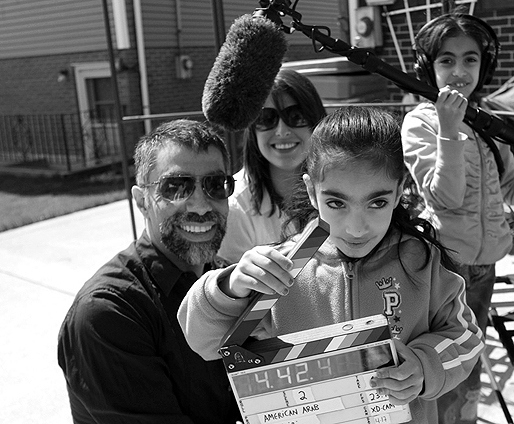
The Film Yap: “American Arab” is obviously a very personal film; can you tell us how you got started on this project and what your vision for it was at that time?
Alshaibi: I was noticing that there was this rising hate and hostility toward Arabs and Muslims in the United States and it was typically based on racists ideas– so I wanted to make a film that exposed these racist sentiments and also exposed who Arab Americans really are. The United States of America is home to almost 4 million Arab-Americans that are very much part of the fabric of this country. But the media and the movies in the United States depict us like crazed, inhuman terrorists. Those depictions make it easier for Americans to dehumanize us and bomb our homelands. I’m saying Arabs are not only part of the United States but we are part of the formation of America. Can you imagine the United States without Casey Kassim, Ralph Nader, Danny Thomas or even Steve Jobs? All of them are Arab Americans. So I wanted to talk about that, but also tell the human story of who we are. Like Amal Abusumayah in my film. She was born in Chicago and raised by Palestinian parents. She has the right to live freely and wear her hijab if she wants to. That is her right as an American. So when a bigot tries to pull off her head scarf and tell her to go back to where she came from, that is the dark spot of America I’m discussing. Every Arab in the United States has experienced this type of harassment and racism in the United States and we are sick of it.
One of the challenges for a documentary filmmaker is adapting to the story as it evolves and goes in unexpected directions. What would you say was the most surprising development over the course of this project?
Alshaibi: When I started the project, I was mainly focused on other people and wanted my own personal story to be more of a secondary narrative. But life moves on even if you are working on a documentary. I moved away from Chicago and had a baby girl with my wife in Iowa; these elements became part of the narrative of the film. My story became part of the bigger story. And I’m OK with that. In a way, it was easier for me to show more of my life and be very open about it.
What is your favorite memory from working on “American Arab?”
Alshaibi: My favorite memory is part of my life and the film: That would be the birth of my daughter, Muneera.
You’ve described this film as a “Coming of Arab story” and, as it shows, much of the Arab American experience is influenced by events in the Middle East. With the increasing violence in the region given the Syrian Civil War and the withdrawal of U.S. troops in Iraq, what are your thoughts on how this will influence the “Coming of Arab story” of the next generation of Arab Americans depicted in your film, such as the young Jassar girls or your own daughter?
Alshaibi: Well, the younger generation needs to know what we went through as Arabs in America. They need to understand that after the attacks on the Twin Towers, that Arabs and Muslims were targeted, questioned, put in jails and abused. Hate crimes went up, and the media and the general American population was indifferent to it. So they need to see this and realize that the United States is their country and to speak out and be vocal about injustice. I want the younger generation to realize that they have a right to be angry. They have a right to speak up and speak out for their human rights and dignity.